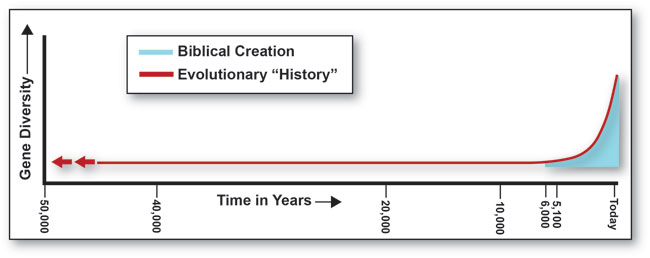Everyone should know that the cosmos was created.1 It also stands to reason that those who “listen to Moses and the prophets,” as Jesus said, should be able to see more specific evidence of biblical creation, including scientific discoveries.2 One such evidence is human genetic diversity, which leaves evolutionary history in a quagmire, while confirming a straightforward interpretation of Genesis.
Generally, any two people have very similar DNA sequences, especially within protein-coding DNA. However, some might have the DNA base chemical “G” at a particular location, but members of another family might instead have a “C” at that position, even though thousands of bases upstream and downstream from that position are identical.
Geneticists recently analyzed human gene differences.3 They compared the placement of the four DNA chemical bases positioned within thousands of genes in over 2,000 people. They focused on differences in protein-coding genes. These comprise less than two percent of the total human DNA, but they hold a more reliable record of past DNA changes than other more highly variable DNA.
The research team investigated the amount of diversity among today’s human genes and how long it took to reach the current amount of diversity. They concluded that human genes diversified recently. The authors wrote, “The maximum likelihood time for accelerated growth was 5,115 years ago.”3 This is a tiny fraction (0.2 percent) of the 2.4 million years of humanity that evolutionists suppose. The explosion of human genetic diversity has occurred in parallel with, and because of, human population growth. With each new person comes another opportunity for DNA differences to arise, either by designed genetic shuffling processes or mutations.4

The results are illustrated in the diagram of the above timeline. One line overlays the researcher’s modeled genetic diversity explosion onto an evolutionary perspective, and the other overlays it onto a biblical timeline. The rapid explosion of human genetic diversity over the last 5,100 or so years easily fits the biblical model, since “these are the three sons of Noah: and of them was the whole earth overspread,” and since Noah was alive near that time.5, 6 The same results, however, raise difficulties for evolution.
For example, if the evolutionary timeline is true, then human population growth and genetic diversity were miraculously unchanged for a few million years before suddenly exploding in just the last few thousand years. What are the odds that every married couple would have had almost exactly two offspring—just enough to replace the parents—survive into the next generation for over two million years or 100,000 straight generations?7 In addition, where are all the human remains that should litter the planet after having been peopled for so long?
In short, why does the human genetic diversity data fit so well with biblical creation? Evolutionary thinking provides no real answer to what caused the radical bottleneck in the worldwide human population at that time, whereas the Bible teaches that it was Noah’s Flood. This genetics study confirms Moses and the Prophets. Both science and Scripture show that humans have multiplied and diversified within the past 5,100 years.
References
- Romans 1:20.
- Luke 16:31.
- Tennessen, J. et al. 2012. Evolution and Functional Impact of Rare Coding Variation from Deep Sequencing of Human Exomes. Science. 337 (6090): 64-69.
- Recent studies indicate that mutations, most of which are nearly harmless, accumulate at a rate of at least 60 per human generation. For example, see Conrad, D. et al. 2011. Variation in genome-wide mutation rates within and between human families. Nature Genetics. 43 (7): 712-714.
- Genesis 9:19.
- If Abram was born in 1900 B.C., then the Genesis chronology would show that Noah lived from 2792 to 1842 B.C., or roughly between 4,800 and 3,850 years ago.
- For a similar analysis, see Thomas, B. Earth Hit the 7-Billion Mark Too Late. ICR News. Posted on icr.org October 27, 2011, accessed July 17, 2012.
* Mr. Thomas is Science Writer at the Institute for Creation Research.
Cite this article: Thomas, B. 2012. A Recent Explosion of Human Diversity. Acts & Facts. 41 (9): 17.














